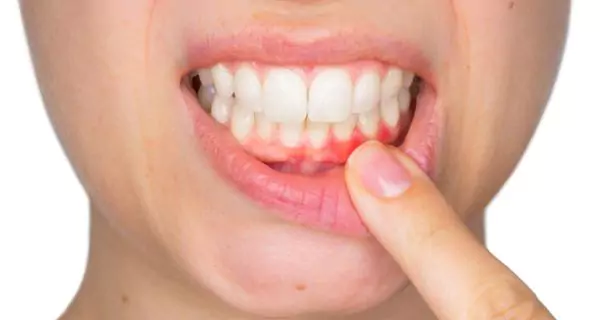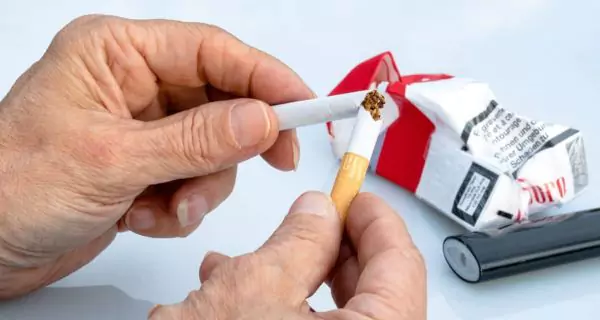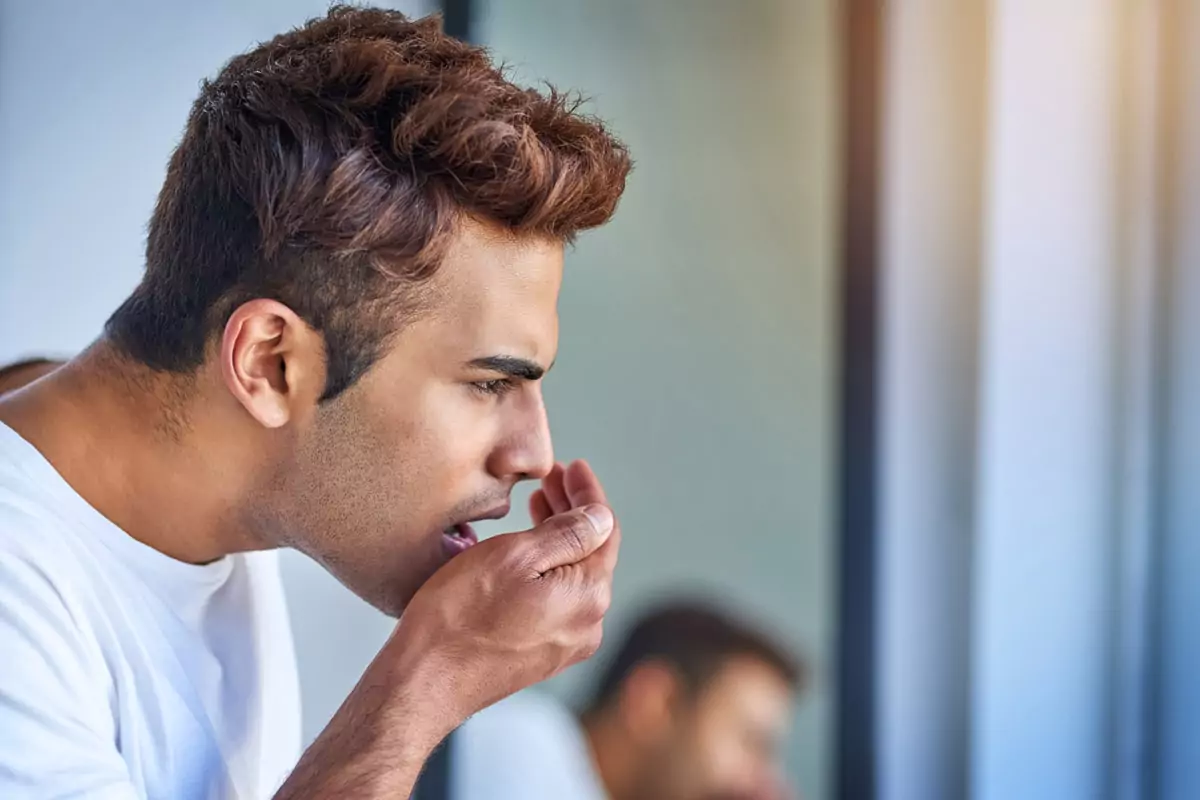Last Updated on: 24th December 2025, 08:14 am
Fresh breath shows that your mouth is clean and healthy. To keep your breath fresh, brush and floss every day, clean your tongue, drink plenty of water, avoid strong-smelling foods, and quit smoking. If bad breath lasts a long time, it could mean a health problem and time to see a dentist or doctor.
Having a fresh breath is more than just smelling good; it is a way of knowing that your teeth, gums, and body are healthy.
When you have fresh breath, you feel more confident when talking, smiling, or being close to others. But bad breath could be embarrassing; and more than that, it may be a signal of other health problems.
Many people want to know how to keep their breath fresh all day. In this article, we will see how the right habits and care are a simple but powerful solution for having a fresh breath.
What causes bad breath?

If you want to have fresh breath, the first step is to understand what causes bad breath. There are several reasons related to oral issues, systemic problems, and habits or foods. Let’s look at each one.
What oral issues cause bad breath?
Most bad breath comes from problems in the mouth. About 90% of bad breath cases start here.
Poor oral hygiene
- When you don’t brush and floss regularly, food particles stay in your mouth.
- This feeds bacteria, which produce foul-smelling gases that ruin your chance of keeping fresh breath.
Bacteria on the tongue
- The tongue’s surface has many little bumps that can trap food, dead cells, and bacteria.
- If you don’t clean your tongue daily using a tongue scraper or a soft brush, these bacteria grow and cause bad breath.
Gum disease

- Gingivitis and periodontitis cause inflamed, bleeding, and infected gums. These problems create strong odors that make fresh breath hard to keep.
- Regular dental visits and cleanings help prevent and treat gum disease.
Tooth decay and abscesses
- Deep cavities trap food and bacteria inside the tooth. If untreated, these bacteria foment strong bad smells.
- Abscesses (pus-filled infections) from untreated cavities or gum disease also cause bad breath because of decay and bacteria inside the mouth.
Orthodontic appliances and dentures
- Braces, retainers, or dentures can collect plaque and food if not cleaned well.
- This buildup leads to bacterial growth and bad odors.
Dry mouth (xerostomia)
- Saliva cleans your mouth and controls bacteria.
- When saliva production is low, due to medications, dehydration, or health conditions, bacteria grow faster and cause bad breath.
- Drinking water and using saliva substitutes can relieve dryness and support fresh breath.
What health conditions cause bad breath?

Sometimes, bad breath is a sign of other health problems outside the mouth.
- Acid reflux or GERD: Stomach acid can come up into the throat and mouth, causing a sour or bitter smell that affects fresh breath.
- Throat infections and tonsil stones: Inflamed tonsils or tonsil stones (hardened food and bacteria in tonsils) can cause strong bad odors.
- Digestive problems: Certain stomach or digestive issues cause internal gases and fermentations that affect the breath.
- Sinus infections or chronic rhinitis: Mucus buildup in the nose or sinuses encourages bacterial growth, leading to bad smells.
- Chronic diseases: Diabetes, liver disease, and kidney problems can create distinctive and persistent bad breath.
If you have good oral care but your bad breath doesn’t go away, it’s important to visit a healthcare professional to check for these problems.
How do habits, foods, and drinks affect breath?

Your daily habits and diet can also affect your breath.
- Strong-smelling foods: Garlic, onions, coffee, and alcohol contain compounds that enter your bloodstream and come out when you breathe, causing bad odors that can last for hours.
- Tobacco use: Smoking or chewing tobacco not only leaves a strong, bad smell, but it also harms your gums and teeth, making bad breath worse. Quitting tobacco improves fresh breath and overall oral health.
- Mouth breathing: Breathing through your mouth can dry it out, leading to more bacteria and odor. Treating nasal issues will help reduce mouth breathing.
- Not cleaning your mouth after eating: Leaving food in your mouth without brushing or flossing lets bacteria grow and causes bad smells.
Bad breath happens for many reasons. Most often, it comes from bacteria in the mouth that feed on leftover food and cause bad smells.
Knowing all these different causes is important to start keeping your fresh breath all day. If bad breath lasts even with good care, visit your dentist or doctor to find the real cause.
How can you get and keep fresh breath every day?
The most important thing for stopping and treating bad breath is to know the underlying cause. Then, you will enjoy a fresh breath every day.
Let’s see what you can do at home and what habits to change.
What can you do at home to stop bad breath?

Brush and floss every day
- Brush your teeth twice a day and floss once a day. This removes food and plaque, which are two common causes of bad breath.
- You can try using electric toothbrushes or products like water flossers or floss picks if it’s difficult for you to floss.
Clean your tongue
- Bacteria often build up on your tongue, especially at the back.
- You can use a tongue scraper or gently brush your tongue for a deep and meaningful cleaning.
Use mouthwash
- It’s better to use an antibacterial mouthwash since others just mask the smell.
- Look for ones with zinc, chlorhexidine, or cetylpyridinium chloride to kill bacteria.
Drink water
- Dry mouth makes bad breath worse.
- Drinking water helps increase saliva production and wash away bacteria.
- You can use a bottle with a time marker to remind you to drink throughout the day.
Chew free-sugar gum
- Chewing sugar-free gum or lozenges helps increase saliva flow, and different tastes give a fresh breath.
- Try a xylitol gum; this helps fight bacteria and improves breath.
Clean dental appliances
- If you wear dentures, retainers, or night guards, clean them daily to remove bacteria and prevent odor.
- Use cleaning tablets, solutions, or sanitizer devices made for appliances to remove bacteria and odor.
What lifestyle changes help you get fresh breath?

- Quit tobacco: Smoking dries out the mouth and leaves a strong, bad smell. Quitting smoking helps improve both your breath and your health.
- Avoid coffee, alcohol, and spicy foods: These can dry your mouth or leave a strong smell. Limit them, especially before social events.
- Eat more fruits and veggies: Crunchy fruits like apples and raw veggies like carrots and celery clean the mouth naturally. They also help make more saliva.
Tip: Keep apple slices or carrot sticks in your bag for a quick and healthy way to freshen your breath.
What foods help you keep fresh breath?
Like there are foods that you may avoid, others can be beneficial for your breath.
- Green tea: has antibacterial effects
- Yogurt: may reduce sulfur compounds in the mouth
- Parsley and mint: can naturally mask odor
Try adding fresh herbs or plain yogurt to your meals for added freshness.
When should you see a dentist for bad breath?

If you maintain good oral hygiene but still experience persistent bad breath, it’s time to schedule a dental exam. Halitosis may indicate:
- gum disease
- infected teeth
- abscesses or oral infections
- systemic issues requiring medical evaluation
A dentist can help identify and treat the root cause of the problem. If this is a systemic issue, they will refer you to a primary doctor or specialist.
What can your dentist do to help with bad breath?
During a dental check-up, your dentist looks at your gums, teeth, and tongue. They try to find what is causing the bad smell. It could be gum disease, tooth decay, or old dental work.
Let’s look at how dental care can help.
Regular dental cleanings
- Even if you brush every day, some areas are hard to clean. That’s why professional dental cleanings are important.
- Your dentist or hygienist removes tartar and plaque that you can’t reach with a toothbrush.
- You should get a cleaning every 6 months.
- Try a tartar control toothpaste like Crest Tartar Protection to support your daily brushing.
Treating gum problems
- Gum disease is a common cause of bad breath.
- If your gums are red, swollen, or bleed easily, you may need a deep cleaning, called scaling and root planing.
- In some cases, your dentist may send you to a gum specialist.
- Using a gentle electric toothbrush, like the Oral-B Pro 1000, can make daily gum care easier and more effective.
Fixing dental problems
- Old fillings, crowns, or broken teeth can trap bacteria.
- Cavities or infections can also make your breath smell bad.
- Your dentist can fix or replace these problem areas. This helps stop bad smells and keeps your mouth healthy.
- A fluoride mouthwash like ACT Restoring Mouthwash helps protect your teeth between visits.
The dentist is your friend and a person who can really guide you to keep your mouth healthy and your breath fresh.
Can children have bad breath too?

Yes, bad breath (halitosis) can also affect children. It’s often caused by poor brushing habits, cavities, or even mouth breathing during sleep. As a parent, knowing what to watch for can help prevent it early.
What causes bad breath in children?
Some of the most common causes include:
- food stuck between teeth
- breathing through the mouth (especially while sleeping)
- cavities or gum inflammation
- not cleaning the tongue properly
How can parents help kids keep their breath fresh?
Here are simple steps you can follow:
- Supervise brushing and flossing until at least age 7.
- Teach your child to clean their tongue gently.
- Offer water instead of sugary drinks.
- Take them to a pediatric dentist regularly.
Conclusion: How can the whole family enjoy fresh breath every day?
Fresh breath is part of a healthy smile for both kids and adults.
To keep it fresh, help your child brush their teeth and tongue, give them water instead of sugary drinks, and take them to visit the dentist often. Adults should avoid smoking, eat fewer sweet snacks, and brush and floss daily.
If bad breath persists, it may be a sign of a dental or health problem. A dentist can help you understand your specific case and needs.
With small daily habits, your whole family can enjoy fresh breath every day.
Frequently Asked Questions
Is morning breath normal?
Does brushing harder clean better?
Can mouthwash replace brushing?
Does smoking really cause bad breath?
How often should I replace my toothbrush for a fresh breath?
Voice and Search (Q&A)
Can bad breath mean I’m sick?
Yes, it can. It might be a sign of gum disease, infection, or even a stomach problem. If it doesn’t go away, see a dentist or doctor.
How can I get fresh breath naturally and fast?
Drink water, chew sugar-free gum, brush your tongue, and rinse with a mouthwash. Avoid garlic, onions, and coffee if you want a quick fix.
What’s the best way to keep my breath fresh all day?
Brush your teeth and tongue in the morning and before bed. Drink lots of water, avoid smoking and sugary foods, and visit your dentist every 6 months.
Share
References
1. Cleveland Clinic. Bad breath (Halitosis). (2025, June 2). Cleveland Clinic. https://my.clevelandclinic.org/health/diseases/17771-bad-breath-halitosis
2. Hennessy, B. J. (2025, August 4). Is halitosis the same as bad breath? MSD Manual Consumer Version. https://www.merckmanuals.com/home/news/editorial/2023/06/08/21/47/halitosis
3. Khounganian, R. M., Alasmari, O. N., Aldosari, M. M., & Alghanemi, N. M. (2023). Causes and Management of Halitosis: A Narrative Review. Cureus. https://doi.org/10.7759/cureus.43742
4. Mayo Clinic. (n. d). Bad breath – Diagnosis and treatment. Mayo Clinic. https://www.mayoclinic.org/diseases-conditions/bad-breath/diagnosis-treatment/drc-20350925
5. MouthHealthy. (n. d). Bad breath. ADA. https://www.mouthhealthy.org/all-topics-a-z/bad-breath
-
Dr. Yeidy Carolina Mesa [Author]
DDS Yeidy Carolina Mesa Passionate Dentist | Advocate for Accessible Oral Health Education Graduating from Universidad CES in 2022, I am a dedicated general dentist with a lifelong passion for helping others and making a meaningful impact in the world. My journey into dentistry began at the age of 7, inspired by my own experience with braces and overcoming a fear of the dentist. This personal journey shaped my mission to help patients conquer their own dental anxieties and embrace a healthier,...
View all posts
-
Nayibe Cubillos M. [Medical Reviewer]
Pharmaceutical Chemestry |Pharmaceutical Process Management | Pharmaceutical Care | Pharmaceutical Services Audit | Pharmaceutical Services Process Consulting | Content Project Manager | SEO Knowledge | Content Writer | Leadership | Scrum Master
View all posts
A healthcare writer with a solid background in pharmaceutical chemistry and a thorough understanding of Colombian regulatory processes and comprehensive sector management, she has significant experience coordinating and leading multidisciplina...Recent Posts
















